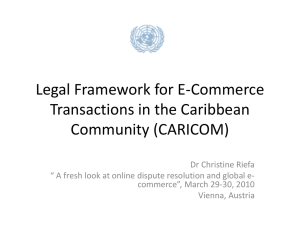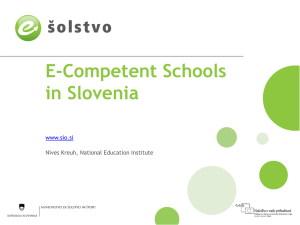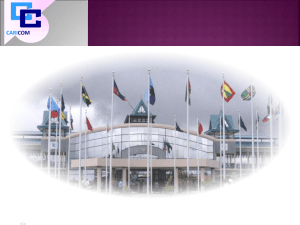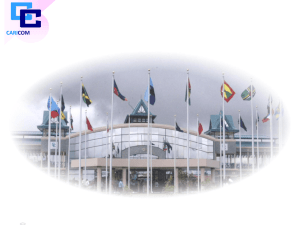Single space CANTO by CARICOM Secretariat
advertisement
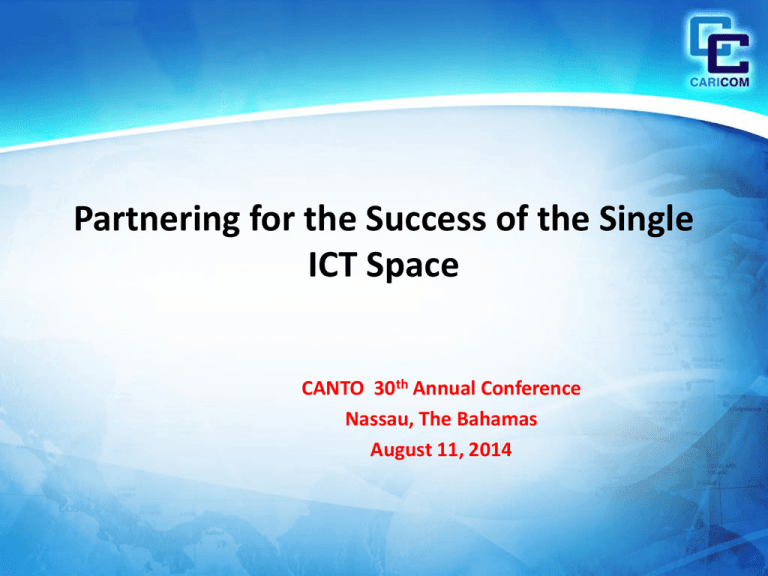
Partnering for the Success of the Single ICT Space CANTO 30th Annual Conference Nassau, The Bahamas August 11, 2014 Bermuda CARICOM Member States Associate Members • 15 Full Members, 5 Associate States •Combined population: >15 million •Total land space : 462, 472 sq km 2 Suriname FLAGSHIP PROGRAMME CARICOM Single Market and Economy (CSME) Single seamless economic space; Shift away from national markets and resources to regional markets and resources; Full employment of all factors of production, improved standards of living and work; Sustained economic development Guided by the Treaty of Chaguaramas (CARICOM) and Treaty of Basseterre (OECS) Specific to ICT: What the reports /indices are telling us Innovation is ‘fast-tracked’ through ICT (and globalisation) Region is improving in policy development framework Challenge with regard to local Caribbean Content and activity (i.e. usage) Many consumers – limited producers Most countries at the basic level of competitiveness (Factor Driven) Not educating for the Knowledge Society / Digital Economy Innovation rich vs. Innovation poor Barriers Very few of CARICOM countries can truly report that the investment made in ICT to date has produced the corresponding benefits that have been promised. Difficulty in achieving economies of scale in all endeavours of economic and social development, in particular with respect to cost of infrastructure, human resource, skills and competencies, High costs of broadband connectivity and lack of funding for capital investment to fund ICT infrastructure; Lack of appropriate skills sets, especially those in Maths, science, technology and engineering High costs of providing these appropriate skills to our citizens for lack of capacity at the national level Absence of a culture of innovation and the opportunity for innovation; Limited or no financial resources available readily Regional Response Heads agreement (2014) to work collectively on the CARICOM Digital Economy A dynamic, innovative, digital single market Recognition that a more digital, networked economy is about far more than broadband. It is about significant change in workplaces and the skills and capabilities of individuals that businesses and countries need to succeed. It is about expanding options and opportunities for individuals, whether as consumers, workers or entrepreneurs. Telecoms/ Connectivity Central: Greater Public Sector use and Citizen Adoption of e-Government Processes SMART Cities. Expanded Job Creation, Entrepreneurship and New Business Development Better CONNECTIVITY and seamless access to Communication & Information Networks Extended CARICOM Brand. Highly Educated and Well-Trained Caribbean people available to the ICT Sector and the Digital economy Growth in Research Innovation and Development of New ICT Products and Services Premised on… Individual Member States benefitting from best practice from other Member States in deploying and diffusing ICT into country( strong helping the weak); Regional project implementation of ICT projects with national impact Opportunities for synergies amongst Member States through sharing and collaboration to be facilitated and encouraged without a burden being placed on any one member state; Fast tracking the Digital Economy Heads mandate for the development of the Single ICT space ( main recommendation from the Regional Digital Development Strategy) CARICOM Regional Strategic plan ( 2015- 2019) approved July 2014 lists the Single ICT space as the main component for developing Technological Resilience CREATING THE ENVIRONMENT FOR INVESTMENT AND PRODUCTION THROUGH THE SINGLE ICT SPACE – 2014-15 (PRIORITY AREAS) Telecoms/Connectivity: Broadband development and access for increased penetration; Reducing and /or eliminating voice and data roaming charges, Spectrum management and re-organisation to facilitate increased competition in the market Legal and regulatory environment - policies, standards, examination of existing models for regulation, copyright, competition, and cloud storage; Development of a single regional information space; Development of the Roadmap for the Single ICT Space CREATING THE ENVIRONMENT FOR INVESTMENT AND PRODUCTION THROUGH THE SINGLE ICT SPACE – 2014-15 (Priority Areas) Bringing technology to the people, creating digital citizens, Cyber security, Resource mobilization and the CARICOM digital agenda to 2025 CREATING THE ENVIRONMENT FOR INVESTMENT AND PRODUCTION THROUGH THE SINGLE ICT SPACE – 2014-15 b) The Caribbean Research and Education Network (C@ribNET): allows the connection of Caribbean institutions such as education, health, libraries, security organizations, and other public institutions Enables member states to share resources and participate in collaborative activities as never before. Connects the Caribbean to the rest of the world's R&E networks so we can access knowledge on a global scale. C@ribNET is well positioned to be the regional knowledge centre and support think-tanks for our continued global collaboration. All countries participating in C@ribNET must nurture the development of the National Research and Education Networks (NRENs) which could help us exploit and develop or national interests. Those countries which are hosts to our key regional institutions have an even more urgent need to form NRENs – to ensure that these organisations can function at their best supported by the additional, secure connectivity provided by C@ribNET. Why a Single Space Creating attractive environment for Investment and production Attempting a single ICT market Enabling the CARICOM digital ecosystem Extending our domestic markets / increasing demand Breaking free from 15+ national markets and rules Boosting Investment in Knowledge Advancing Innovation Bringing all initiatives together Speaks to the needs of/ for: Connectivity Communication Community Citizenry What? What? – the Digital layer of the CSME The CARICOM Single Market and Economy (CSME) as the fundamental enabling environment for sharing resources, including ICT infrastructure, human resource capacities, and harmonisation of policies and legislation and support for our CARICOM Agencies; that have been established to provide the necessary governance arrangements to foster collaboration and cooperation between our countries. Framework of the Single Space Entrepreneurs Innovation Collaboration & Partnerships Local Content & Applications Education and Capacity Building Supporting Policy Affordable Access ICT Infrastructure Benefits of Single Space Benefits Creation of efficiencies, Generation of new businesses, Stimulation of growth in the ICT sector and The promotion of opportunities for research and innovation; “By focusing on these priority areas, we believe that ultimately and strategically, this will lead to improving the global competitiveness of our individual member states. Of course at the lowest denominator this must translate to job creation for a significant larger percentage of our citizens which ultimately will lead to a prosperous society with corresponding consequences of crime reduction and allow our citizens to live meaningful lives”. Quote from Lead Head for S&T Characteristics of Single ICT space Harmonised ICT policies, legislation and regulations, facilitating consistent pan-Caribbean service offerings; Affordable access to broadband networks and services nationally and regionally; Wide availability of (digital) information content to foster stronger regional identity, make use of our cultural strengths, cooperation and integration; Interconnected Government networks for seamless exchange of information and services among regional Governments; for education and research as well as for enhancing social and economic services; Integrated systems of numbering to enable seamless service offerings and operations region-wide; and Consistency of quality and service pricing across the region, including elimination of intra-Caribbean mobile roaming charges. Specific requests to CANTO Agree to support a Technical Working Group comprising – CANTO Regulations and Emerging Technology Committee Meeting Representatives of the CARICOM ICT Cluster of Organisations ( CARICOM Secretariat, Caribbean Telecommunications Union (CTU), Caribbean Broadcasting Union (CBU), Caribbean Centre on Administration Development(CARICAD) and Caribbean Knowledge and Learning Network (CKLN) ( a representative of CIVIC (Caribbean ICT stakeholders Virtual Community); ITU and UNESCO The Committee will of course be able to co-opt other experts and expertise as it deems fit. Requests #2 Share as much as possible development plans ( existing and emerging operators) for the period 2014 – 2019; Reduction or elimination of voice roaming rates in the first instance and then to review and continue discussion on reduction of data roaming rates; Technical support to aid the development, enactment and harmonisation of pertinent legislation , policy and guidelines ; Technical support and collaboration on development of common regulatory principles with respect to the allocation and use of spectrum to ensure vitalisation of the Single ICT space; Requests #3 Promote infrastructure and spectrum sharing and spectrum trading Including decisions with regard to ‘blocking’ of any free applications on the network and help to promote net neutrality; Tangible assistance in building the App. Economy; Collaboration on public and other consultations; Provision of timely, pertinent information on issues which affect consumers ( including simplification of contracts and policy guidelineConsumer protection: plain language contracts, with more comparable information, and greater rights to switch provider or contracts, ); Any other emerging issue which could positively promote the development of a pan/CARICOM/Caribbean telecoms market. Governance: Primary Regional Agencies for Collaboration/ Implementation Council for Trade and Economic Development (COTED) ICT – Ministers responsible for ICT - oversee the development and implementation of the road-map on the Single ICT Space and that the road-map be presented for consideration at the July 2015 Meeting of the Conference of Heads of Government “confirmed that the CARICOM Secretariat is responsible for the coordination of digital economy activities and all regional organisations are required to co-operate and collaborate with each other to ensure the successful development of the CARICOM Digital Economy.” Governance The development of a Road Map for the CARICOM Single ICT Space to be undertaken through the ICT Cluster ( Reports to the SG CARICOM) comprised of : CARICOM Secretariat Caribbean Broadcasting Union, Caribbean Telecommunication Union, Caribbean Knowledge and Learning Network, CARICAD Senior ICT Officials and Lead Agencies( CARICOM Agencies, CANTO, ITU, UNESCO, ECLAC), and The Commission on the Economy; and Resource Mobilisation Human resources being assessed as part of the Services , Education and other sectors Strong need for: technical resources Financial resources ( proposals /concept notes ready in some cases) Regional Commitment to you Heads of Government have agreed to facilitate and demand the cross-collaboration needed and lead by example Simplification and reduction of regulation for companies Ease of doing business / attracting new business Unified Market More coordination of spectrum allocation – so that we see more wireless broadband, more 4G, and the emergence/ fostering of pan-Caribbean mobile companies with integrated networks Standardised wholesale products: encouraging more competition between more companies Protection of Open internet: guarantees for net neutrality, innovation and consumer rights. CHALLENGE and CALL to ACTION! “ ICT is the last frontier of regional integration” Secretary General CARICOM THANK YOU! Partnering for the Success of the Single ICT Space Jennifer Britton Deputy Programme Manager – ICT4D CARICOM Secretariat www.caricom.org Email: jennifer.britton@caricom.org



